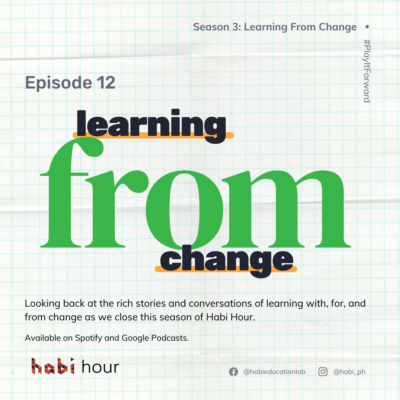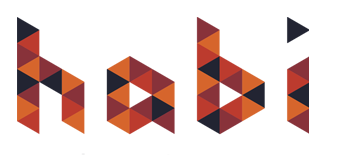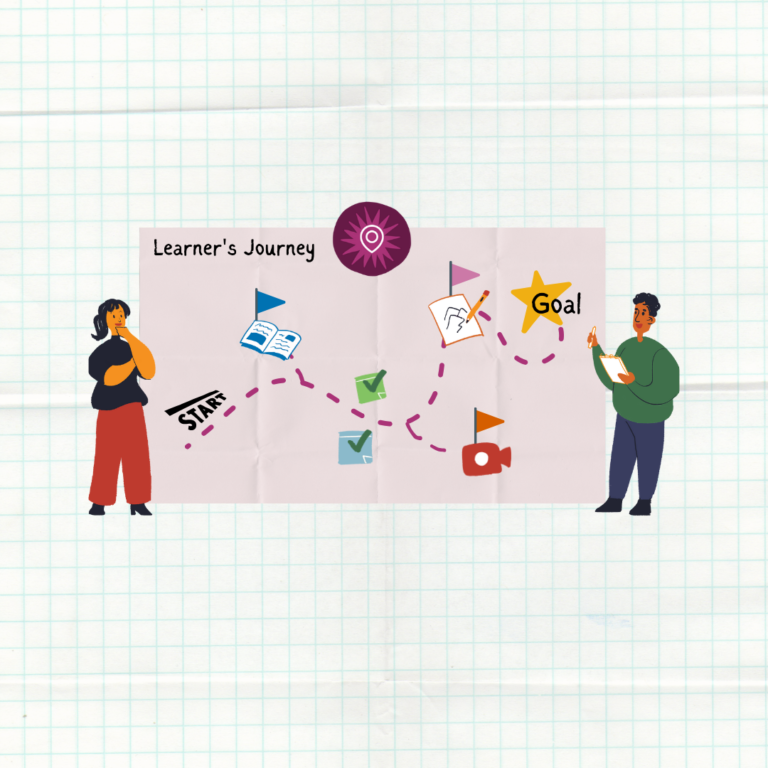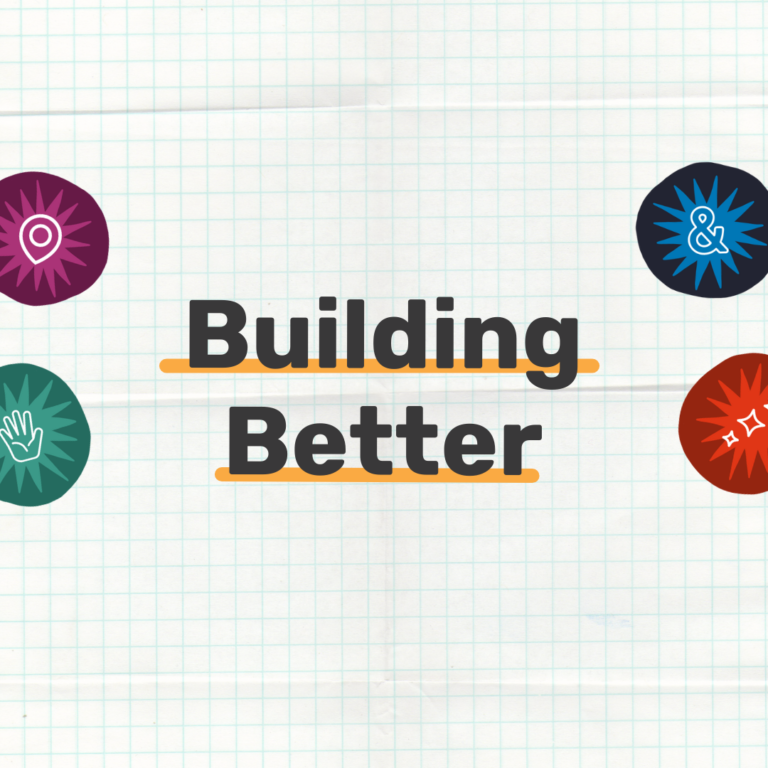In this season finale of Habi Hour, we look back at our stories and conversations in an attempt to explore what learning from change means.

Overview
18 June 2022 | 21 min and 10s
In this season finale of Habi Hour, we look back at our stories and conversations in an attempt to explore what learning from change means.
Transcript
Jovi (voice over): From how the pandemic transformed our lives, cultures,and ways of working, to how our slow progress through time has shifted the way we view things such as dating and heroism – change is and always will be a great and often unavoidable force that can spark a lot of learning. Let’s take a look back at some insights and ideas from this season of Habi Hour which was all about Learning from change
MUSIC: Habi Hour Intro
Jovi (voice over): We kicked off this season talking about Habi as a workplace, what makes it unique, and how it weathered the great changes brought about by the pandemic. Here we have a couple of LXDs sharing their experiences in “7 Things about Habi as a Workplace”.
[light music]
Chess: Isang skill na I really didn’t know before is prototyping. So prior din to Habi, sanay ako na dapat ’yung outputs, 90% ayos na, pulido na. Tapos n’ung pagpasok ko sa Habi, sobrang nabasag ’yun ng prototyping mindset, na sometimes as designers, better to design our way forward by prototyping kaysa we wait for the end na mayroon na tayo final product, hindi pa natin na ta-try or napo-prototype.
Kaye: So ironically, one of my top strengths has to do with spotting and anticipating problems. So it can be challenging to start with strengths first. But it’s a good challenge and it makes people feel seen in a way that makes them feel good about themselves. And I think that since using a more strengths-based approach, I’ve become more intentional about my interactions with people. I ask which talent they need at this moment so I can activate that and put on hold something that might not be helpful at this time. And I also look at my team’s talents to adjust my own ways of working so that everybody on the team feels like they can bring their best selves to work.
Jovi (voice over): Being a learner is innate to being a learning experience designer; we’re open to new and unfamiliar methods, cultures or processes even before we came to Habi. Like what Chess and Kaye talked about in the first episode, having a prototyping mindset and a strengths-based approach is very apparent in Habi.
In “Team Cultures that Shape Us”, LXDs Kimmy, Lacey, and Luigie talk about the culture and values that shape Habi’s ways of working, and how the difference between our previous workplaces and Habi spurred on changes that led us to do our best work. Here we have Luigie talking about how we practice embracing change and how it evolves our process and ways of working.
[light music]
Luigie: I think related din to d’un sa another value natin na evolutionary processes, kapag meron tayong Huddulo, or ’yung end of the month gathering ng Habi, meron tayong portion sa Huddulo natin na governance proposals. And ito, isa to sa pinakanakakatuwa at nakaka-amaze as a newcomer to Habi, na merong gan’ung monthly space for evolution, evolution ng mga proseso, evolution ng mga roles, evolution ng mga trabaho natin in Habi. Na may space every month na papakinggan ng lahat, kung merong somebody na may proposal para maging mas maayos, mas maganda yung relationships sa organization, maging maganda ’yung ways of working and processes.
Jovi (voice over): Evolutionary processes. Yes, you heard it right! Like what Luigie mentioned, we in Habi seek to always evolve our processes, which may also lead us to cringe about our old processes, systems, and ways of working. We explore cringing as an indicator of learning from change in our 3rd episode, “Cringing Can Be a Good Thing”. That feeling of embarrassment over our past selves propel us to do and be better. Here are a couple of our LXDs sharing what they learned.
[light music]
Maia: Cringing is obviously not the greatest feeling in the world, but you see how there’s something so profound about it? Cringing means we’ve grown. Cringing means we know better. Cringing means we are learning from change. We cringe because we know what good design looks like, and how much better the design of things around us can be.
Bernice: What I learned about my designer self is that things might not go according to my plan as expected, and they will likely not go according to plan if I stick to a rigid way of designing without thinking too much or maybe not giving enough thought. The way to be human in designing and one of the things that we need for well-designed experiences is to actually design according to not a perceived need, but an understood need. That I should have designed, that I should design, for the learners, not to follow an equation of what supposedly good design is.
Jovi (voice over): Yes, cringing means we know better and like what Bernice shared, she learned to design according to what is needed. The key word? Empathy. Part of our design principles is to be human or “Makatao” and it starts with having good communication, to learn from other people’s contexts and perspectives. Having a good conversation is essential to learn from and design for what they need.
In “Paano ba Makipag-usap?” we look at the elections as a period of time where changing minds (and inevitably securing votes) becomes the main means of ordinary people to engage in and set the direction for the future. We explore conversations as a tool for change through the KAMPI framework.
[light music]
Celina: For sure, meron tayong mga nakasanayan o kumportableng pamamaraan ng pakikipag-usap. “Ganito talaga ko eh,” o “Ang hassle naman niyan! Di ko kaya yan.”
Ang KAMPI framework ay isang paalala para sa ating lahat na, sa gitna ng mga pagkakaiba-iba ng mga pananaw at paninindigan natin, malayo ang mararating ng pakikipag-usap kapag ginamitan ng radikal na pagmamahal.
Jovi (voice over): The pandemic really caused a massive shift in the way teaching and learning happens, especially for more practical or physical learning experiences. In “Dancing Beyond the Screen” we talked to PJ Rebullida of Galaw Co. who shared what they learned from teaching dance remotely during the pandemic.
[light music]
PJ: Well, it’s interesting that I don’t think the pandemic has changed me but rather it has strengthened that resolve. And this resolve started when it was early in my dance career. In my dance career, I made this objective with a dear friend who passed away, Mary. We were talking after doing a pas de deux, and we were like, “You know what? I’m a dancer and an artist because I want to move people, to feel, to experience, to think beyond their normal scope of thinking.” And that resolve is stronger now.
Jovi (voice over): A global pandemic isn’t the only thing that could cause change to happen. The fact that every new generation arrives with a different set of experiences, values, attitudes, and skills can cause significant changes and challenges to the status quo, and this is especially so in the workplace. In our 6th episode titled “Culture Changers”, we talked to Nikki Vergara of Positive Workplaces on how their internship programs become a two-way process and how encouraging self-determined and autonomous interns can change the Philippine workforce of the future. Here she talks about how schools can create more effective internship programs for their students:
[light music]
Nikki: I think if they start with a foundation, which is helping their students or the interns set a direction for themselves, then they would be able to make the matching process better. I think a lot of the times, interns just jump into any open opportunity, they don’t realize the matching process is two-way; it’s not just you begging for an internship from an organization. The organization has to be aligned to what you want, what skills you want to build, what culture you want to experience, what kind of people you want to surround yourselves with. And I think if schools gave students a clearer picture, or guided them through getting to know themselves more, what skills they want to build, what workplace they want to be part of in the future, then the internship would be more student-centric. It’s not about them fulfilling their OJT or their practicum hours. It’s about them using this as an experience so that they get to know themselves better and experience a workplace of their dreams, so that they can continue pursuing that and creating that for others.
Jovi (voice over): Despite the changes happening around us, some things will tend to remain the same. Intention and presence are important factors that we will need to take care of and prioritize no matter how large of a change we need to adjust or adapt to.
Take, for example, dating. In “Learning to Date Intentionally” we talk about how the pandemic and technological advancements have unlocked new experiences and ways to go about dating and relationship-building, but the intentions and purpose of such interactions remain the same
[light music]
Chess: Starting with an intention. Kunwari, it’s the first date, ano ba ’yung intention ko with this date. To get to know the person? ipakilala rin sarili ko? And that also influence ’yung activity that I will suggest or recommend.
Other than the intention, mas specific na rin ang pagpili ng medium or channel for interaction especially for online dates. Kung video call ba ang gagamiting natin or online call, because it also influences or has an impact on the interaction. Kunwari, kung video call, kita mo ’yung person and kita mo rin yung reaction, pero still considering ’yung ating bandwidth and internet capacity.
Jovi (voice over): Time and culture also influence changes in our understanding of concepts and identities. In “Mga bagong bayani” our friends from Dakila revisit how we understand heroism, activism, and how we define our idea of “bayani”
[light music]
Krishna: When we say “bayani,” basically we often see it as Captain America, Spider-man, all these western concepts of heroes na very, you know, they’re gonna save the world. Medyo individualistic, sometimes to a fault; we’ve seen the movies diba? But siguro yung beautiful thing about when we talk about ”bayani”, “bayanihan”, “bayan”, ay if you look at Filipino psychology, sobrang rooted ng self natin in our community, hindi po separate ’yung loob natin sa kapwa natin.
Jun: Parang akala nila pag aktibista, ay parang magiging komunista ka, magiging,.. may gan’un ano eh. Dahil siguro paulit-ulit din na propaganda yan ng gobyerno, ng kung sino man. Sana hindi ganun, kasi hindi naman gan’un eh, hindi naman gan’un ’yung aktibismo eh, di ba? ’Yung maging active ka lang sa community mo, aktibismo na ’yun eh; ’yung tumutulong ka sa kapwa o sa loob mismo ng komunidad mo, kung paano niyo inaayos ’yung komunidad niyo, ’yun na rin ’yun eh, di ba?
Jovi (voice over): More professional interactions such as coaching and mentoring have changed and adjusted to more remote setups, allowing for these kinds of services to expand their reach. In “Coaching you Forward” Clifton talks about presence and why its important for connecting people even when coaching remotely
[light music]
Clifton: It’s really the discipline of staying present. That would mean just completely letting go of whatever you have been doing and what you are about to do and just stay there. It sounds commonsensical but because of the design of spaces right now in terms of where our laptops are, it doesn’t really lend to focus so much. So I think we have work to do in terms of that, in terms of telecoaching. If we could design a space, or even a device, or even just go back to face-to-face to do it just to target the staying present goal then that is something that I believe would have presence. Like tayong dalawa ngayon, I think you’re very present with me, and I think I’m present with you, and in a way that can lead to better connections I suppose.
Jovi (voice over): In our follow up episode “Coaching me Forward” we explore the impact of coaching and how such a process inspires change and growth. Listen to some of our LXDs sharing their experience with being coached
[light music]
JPaul: Before coaching, tingin ko medyo aware naman ako sa kung sino ako. But since coaching, narealize ko na marami pa palang aspeto ng pagiging ako na puwede pang i-explore, aspeto ng pagiging ako na baka hindi ko masyadong napag-isipan, or puwede pala siyang tingnan in a different way or in a different light. Mga bagay na akala ko dati ay weakness, mga bagay na akala ko dati, dapat ko siyang ayusin or ’wag gawin.
Thessa: I felt how inadequate it is to just being aware of my strengths are. Like, “Okay, I’m a Relator, a Developer, and my Discipline is very high.” But in the beginning, they were just words for me. Through coaching. I learned how to make use of these as strengths. Like paano ko sila magagamit, how I put these into action. D’un talaga ako naalalayan ng aking coach.
Amiel: To be honest, akala ko dati yung coaching makikinig ka lang. Makikinig ka lang sa coach. So magha-highlight siya ng kuwento niya tapos magshe-share siya ng experiences niya, magbibigay siya ng direction tapo, siya yung magda-drive talaga ng coaching session. Pero ngayon, ’yung coaching, sa akin, ’yung coachee pala yung magda-drive ng conversation. Ikaw yung magha-highlight ng experiences mo. Ikaw yung magha-highlight ng story mo, tapos d’un kayo magstart. Ime-meet ka ng coach kung nasaan ka. Tapos ayun ’yung magiging foundation ng conversation niyo. Ikaw yung magda-direct nung sarili mong coaching session. And I think it’s beautiful.
Jovi (voice over): The way we access and consume information has also drastically changed over the past few decades, and has had a significant impact across all fields and disciplines and aspects of life. Dr. Erin of TheNerdyDerma shares in our last episode “The Doctor is IN” how her medical practice has been affected by how information (and misinformation) has spread, what she learned from the experience and how she can help better inform her patients
[light music]
Erin: Naaalala ko yung day the ’yun eh nagbabasa ako ng slides sa training one of my friends nag-send siya sa aking article, and it was a very controversial article sa sa skin world about moisturizers. […] Parang na hindi raw maganda mag-moisturize kasi when you moisturize, the skin cells get stuck on your face or your your skin becomes sleazy and it doesn’t produce moisture. It’s wrong on so many levels, na there and then gumawa ako ng point by point rebuttable explaining why these things are incorrect. […] And right there and then, sabi ko, “No, no, no, no, no, no, ito siya. Moisturization it’s good for the skin!” Ano pa ’yun, Facebook ’yun, ’yung unang-unang post. Tapos when I posted, it was because I just want to correct ’yung misinformation regarding that very very popular article, […] And then a few days later para siyang nag-snowball. Ang daming likes. And daming comments that people were saying, “Oh my gosh gan’on pala ’yun?”
Erin: Mayroon talagang parang paucity ng information both sa social media and I guess sa clinics din. Kasi, for example, ako, people think just because you are a derm you know everything there is about the skin. That’s not true. As a derma ang alam namin, of course we know the anatomy, the physiology how the skin works, but things like toners, serums, ’yung mga ’yun, I learned it because I studied it after ko na mag-derma kasi gusto kong matuto about skin care. So nag-research ako on it pero they don’t teach it in school, in derm school.
MUSIC: Habi Hour Outro
Jovi (voice over): This season of Habi Hour has been all about Learning from Change. Whether it’s an update or upgrade on what we know and how we act, a complete pivot or transformation in what we do, or even a reminder for us to return to our intentions and motivations, change will always stimulate a response in us. If there’s one thing we wish our listeners to take away from our episodes this season, is that there will always be something to learn when we embrace change.
Many thanks to our guests and collaborators who helped make this season possible, and a big thank you, dear listener, for joining us in our third season of Habi Hour!
Gerson (voice over): This episode was written, edited, and produced by Habi Education Lab. Original theme music by Howard Luistro. For more Habi Hour episodes, follow us on Spotify, Anchor, Google Podcasts, or visit https://habieducationlab.org/habihour. Salamat sa pakikinig. Thanks for listening.


